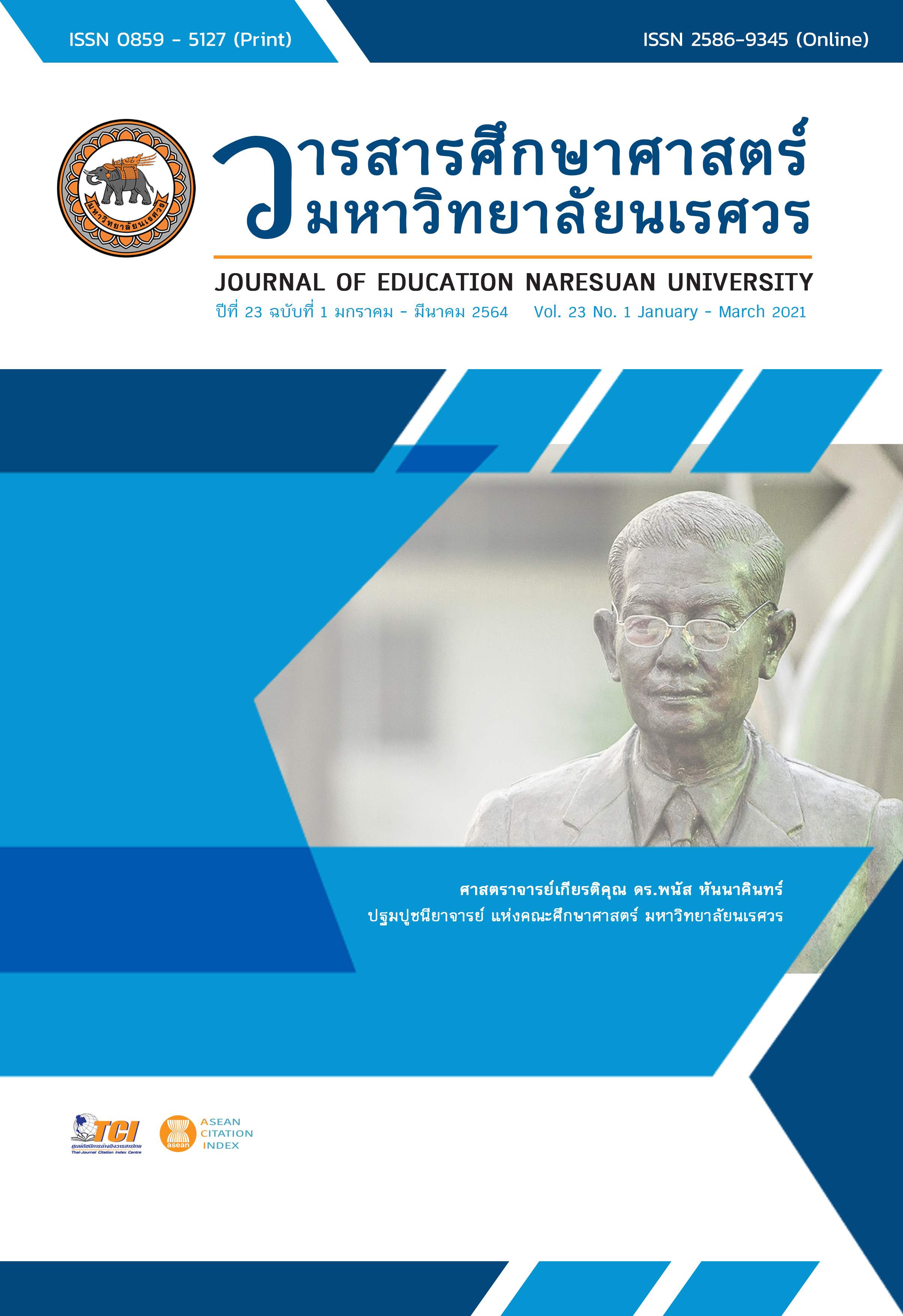DEVELOPING SCIENCE AND MATHEMATICS LEARNING MANAGEMENT COMPETENCY OF GRADUATE STUDENTS IN EARLY CHILDHOOD EDUCATION USING PHENOMENON-BASED APPROACH WITH E-LEARNING MEDIA การพัฒนาความสามารถการจัดการเรียนรู้วิทยาศาสตร์และคณิตศาสตร์ ของนิสิตระดับบัณฑิตศึกษา สาขาวิชาปฐมวัยศึกษา โดยใช้ปรากฎการณ์เป็นฐานผสานสื่อบทเรียนอิเล็กทรอนิกส์
Main Article Content
Abstract
The purposes of this research were to: 1) develop the lessons of science and mathematics learning management using phenomenon-based approach with e-learning media, 2) study the effects of the phenomenon-based approach with e-learning media on the learning management capacities of graduate students in early childhood education, 3) explore the satisfaction of the graduate students in early childhood education on e-learning media. The target group was the 27 graduate students who registered the course of Science and Mathematics learning management for young children. The research instruments included: 1) the learning management plans of phenomenon-based approach with e-learning media, 2) pre- and post-tests, 3) evaluation form of learning management plans, 4) evaluation form of science and mathematics learning management for young children, 5) the satisfaction questionnaire towards e-learning media, 6) reflective students’ learning journal, and 7) instructor’s records after teaching. The results indicated that 1) the lessons of science and mathematics learning management using the phenomenon-based learning with e-learning was at the most appropriate level, with the total average 4.77, 2) the students had better knowledge in designing post-learning learning management plan (µ = 9.04) than before (µ = 12.04). The ability to design science and math learning management plan was at a very good level and able to manage learning at a very good level, and 3) the students were satisfied the e-learning media at the most level.
Article Details
The owner of the article does not copy or violate any of its copyright. If any copyright infringement occurs or prosecution, in any case, the Editorial Board is not involved in all the rights to the owner of the article to be performed.
References
Ali, M., Hossain, S. M., & Ahmed, T. (2018). Effectiveness of e-learning for university students: Evidence from Bangladesh. Asian Journal of Empirical Research, 10, 352-360.
Butkatanyoo, O. (2018). Phenomenon-based learning for developing a learner’s holistic views and engaging in the real world. Journal of Education Studies, 46(2), 348-365. [in Thai]
Insaard, S. (2018). E-Learning lesson design for higher thinking skill development. Bangkok: Se-Education publication. [in Thai]
Kamgamon, R., & Buasomboon, B. (2016). A study of Kabyanee writing achievement of prathomsuksa 5 students using Brain-based learning (BBL) approach. Veridian E-Journal, Silpakorn University, 9(2), 1060-1077. [in Thai]
Mahavijit, P. (2017). Learning innovation from Finland. The Institute for the Promotion of Teaching Science and Technology, 45(209), 40-45. [in Thai]
Office of National Education Commission. (2019). The curriculum training of science education for science and mathematically gifted learner report. Retrieved October 31, 2019, from https://www.obec.go.th/wp-content/uploads/2019/06/Finland-pdf [in Thai]
Samahito, C. (2019). Phenomon-based learning experience provision for young Children. Silapakorn University Journal, 39(1), 113-129. [in Thai]
Symeonidis, V., & Schwarz, J. F. (2016). Phenomenon-Based Teaching and Learning through the pedagogical lenses of phenomenology: The recent curriculum reform in Finland. Forum Oswiatowe, 28(2), 31–47.
Wongcharlee, S. (2018). Influences Thailand 4.0: Thai teachers’ being and existence. Journal of Graduate Studies Valaya Alongkorn Rajabhat University, 13(3), 280-286. [in Thai]
Zhukov, T. (2015). Phenomenon-based learning: What is PBL? Retrieved August 22, 2019, from https://www.noodle.com/articles/phenomenon-based-learning-what-is-pbl


